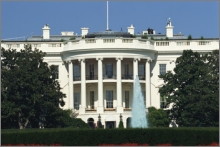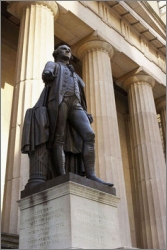What Do Presidents Do After their Presidency Ends?
A Short Overview
by www.SixWise.com
Amidst all of the election coverage and speculation over who will be the next president of the United States, most people don't think twice about where the current president will wind up come January.
|

As a general rule, the younger the president is when he retires, the more time he tends to spend in the limelight as ex-president.
|
For many ex-presidents, though, their post-presidencies are just as colorful as their time in office. Here we've uncovered what some of the most well-known presidents have done with their time after they left the White House.
Bill Clinton: After relocating to New York state, Bill Clinton has circulated as a public speaker advocating multilateral solutions to worldwide problems. He has earned more than $40 million in speaking fees in the past six years, records show. Clinton also wrote a "soul-searching" memoir titled My Life and devotes time to "public service," which ranges from charitable and international work to fundraising for his party.
George Bush Senior: Bush largely retired from public life after leaving office, although he has given a handful of paid speeches and was involved in business ventures with the Carlyle Group. Bush published a book of collected letters from his life (All the Best, George Bush, and co-authored a book on foreign policy issues titled A World Transformed. After leaving the White House, George Bush also parachuted from a plane, something he hadn't done since World War II.
George Washington: After his presidency he retired to Mount Vernon, and was asked to be the American Commander if the United States went to France over the XYZ affair. Since fighting never occurred on land, he did not have to serve, however he did take up a career making whiskey. Washington's farm manager James Anderson convinced Washington to build a large-scale distillery, which was completed in 1798. Washington produced 11,000 gallons of whiskey a year, which sold for 50 cents a gallon for the common variety and $1 a gallon for the more refined version.
Thomas Jefferson: Jefferson lived in his house "Monticello" after he descended from the post of president until his death in 1826. During that time he established the University of Virginia, including designing the buildings, marking the places where those buildings were to be built, selecting books for the library and designing the curriculum. The school opened in 1825.
|

George Washington became a successful whiskey maker after retiring from his presidency.
|
Jimmy Carter: When he first left the White House, Carter called it "an altogether new, unwanted and potentially empty life." His first year was spent working in his wood shop, writing a White House memoir and raising money for a presidential library. However, in the years to come Carter began working with Habitat for Humanity and then opened the Carter Center, which developed programs to alleviate suffering and improve lives around the world. In 2002, Carter received the Nobel Peace Prize for his ongoing efforts to make the world a better place.
Richard Nixon: After his resignation, Nixon traveled throughout the world, speaking with world leaders including Japanese Prime Minister Yasuhiro Nakasone, Chinese leader Deng Xiaoping, Singaporean Prime Minister Lee Kuan Yew, and Communist Party General Secretary Mikhail Gorbachev. Along with a regular schedule of speaking engagements, Nixon completed 10 books during his post-presidential lifetime, and helped plan and build his presidential library and birthplace memorial.
What will George W. Bush do come January 2009? Reports say he and the ex-first lady will be moving back to Dallas, Texas, but from there only time will tell.
Recommended Reading
What You Need to Know About ... Interpol
The 9 Most Shocking Conspiracy Theories That Turned Out to be True
Sources
Buzzle.com Biography Thomas Jefferson
PBS.org Jimmy Carter
Nixon.Archives.Gov
WashingtonPost.com